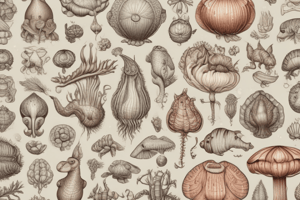Podcast
Questions and Answers
The colossal squid is the world's largest mollusk, measuring up to almost 50 feet ______.
The colossal squid is the world's largest mollusk, measuring up to almost 50 feet ______.
long.
Cephalopods include the octopus and ______, and have a prominent head and a well-developed brain.
Cephalopods include the octopus and ______, and have a prominent head and a well-developed brain.
squid.
Mollusks have different feeding strategies, from capturing food with gills to being active and efficient ______.
Mollusks have different feeding strategies, from capturing food with gills to being active and efficient ______.
predators.
Flashcards are hidden until you start studying
Study Notes
- The colossal squid is the world's largest mollusk, measuring up to almost 50 feet long.
- There are approximately 160,000 living species and probably 70,000 extinct species of mollusks.
- Mollusks are typically divided into ten classes, of which two are extinct.
- The major classes of living mollusks include gastropods, bivalves, and cephalopods.
- Gastropods include snails and slugs, and have a well-developed head.
- Bivalves include clams, scallops, oysters, and mussels, and have two parts to their shell.
- Cephalopods include the octopus and squid, and have a prominent head and a well-developed brain.
- Cephalopods are thought to be the most intelligent of invertebrates.
- Mollusks have different habitats, from gardens to deserts, rivers, lakes, and the ocean.
- Mollusks have different feeding strategies, from capturing food with gills to being active and efficient predators.
Studying That Suits You
Use AI to generate personalized quizzes and flashcards to suit your learning preferences.




